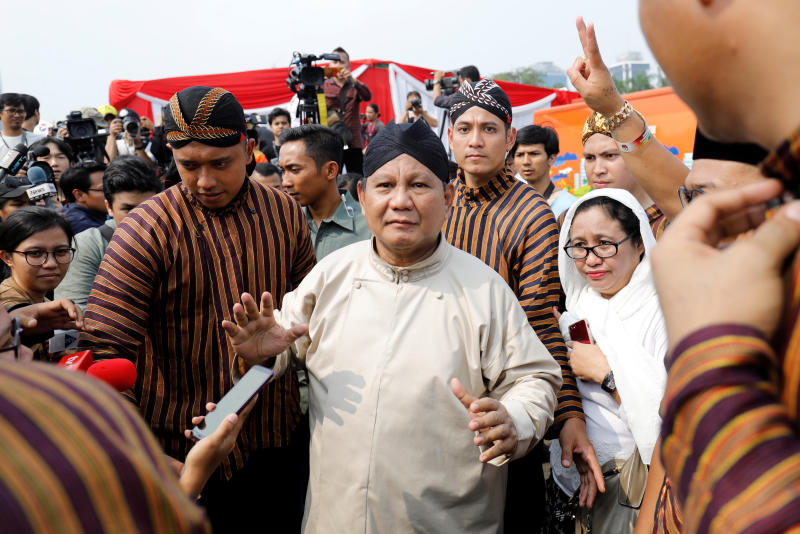Indonesian presidential candidate Prabowo reveals big ideas to boost economy
Sign up now: Get insights on Asia's fast-moving developments

Prabowo Subianto leaves a ceremony marking the start of the campaigning period for next year's election in Jakarta, on Sept 23, 2018.
PHOTO: REUTERS
Follow topic:
JAKARTA - Indonesia's presidential candidate Prabowo Subianto said on Wednesday (Nov 21) that he has a "big push strategy" to make the country a prosperous nation, catching up with some of its South-east Asian neighbours.
Among the core programmes he is targeting is achieving self-sufficiency in food, energy and water, Mr Prabowo said in remarks at the annual Indonesia Economic Forum.
"My strategy will be to use our competitive advantage," he said, referring to agriculture and agribusiness.
Mr Prabowo is seen as trailing President Joko Widodo so far for the presidential election in April next year. To attract voter interest, the presidential challenger has been throwing up big ideas in recent weeks.
Last week, Mr Prabowo's team said it plans to slash corporate and personal income taxes if he comes to power, so as to better compete with low-tax neighbours like Singapore in luring more investments.
Mr Prabowo said on Wednesday at the forum: "We are occupying one-third of the tropical zones of the world... We can have three harvests a year with technology, good management."
Mr Prabowo said Indonesia can regrow 88 million ha of destroyed forests - twice the size of the island of Sumatra - to make them productive again to help meet the country's self-sufficiency goal. He did not detail how he would take over huge tracts of land to replant forests.
Large chunks of three of Indonesia's main islands - Java, Sumatra and Kalimantan - have been cleared for farming areas and plantations, from rice to oil palm and other commodities like rubber.
He said Indonesia's forests are vital for food production and renewable energy generation.
As examples, he said the forests can produce bioenergy such as bioethanol from sugar palm trees and biocoal by intensely heating biomass.
The 66-year old retired army general criticised Indonesia's current heavy reliance on fuel imports, while at the same time exporting a big amount of crude oil.
He warned of the depletion of energy resources, citing a projection that the resource-rich country will need to source its entire energy or fuel needs from imports by 2027.
State-owned energy firm Pertamina said in September that oil imports stood at an average of 393,000 barrel per day (bpd) up to end-August. This is 6 per cent higher than in the entire year of 2017, when it imported 370,000 bpd on average.
Despite the inward-looking orientation, Mr Prabowo said he will be open to foreign investment and is willing to learn from other countries with advanced technology, such as India and the United States, on agriculture issues.
His big ideas on economic issues are among the key highlights of the campaign of Prabowo, the son of Indonesia's notable economist Sumitro Djojohadikusumo.
Mr Prabowo's running mate is businessman and former Jakarta deputy governor Sandiaga Uno.
The pair's economic policy team includes economist Dradjad Wibowo, a politician from the National Mandate Party
Mr Prabowo and Mr Sandiaga are challenging President Joko and his running mate, cleric Ma'ruf Amin, in the April polls.
Mr Prabowo on Wednesday also promised that if elected, he would emulate the success stories of countries that have managed to reduce poverty significantly.
He cited China, which he said lifted more than 90 per cent of its population from the poverty line from 1978 to 2018 with its "economic miracle".
"I am convinced that we can turn the country very fast, but we need a clean and strong government," he said.
Mr Prabowo touched on various indicators to show Indonesia is lagging behind some of its South-east Asian neighbours.
The country's tax ratio, which stood at 10.3 per cent to its GDP, ranking Indonesia 112th out of 124 countries in 2016. This is much lower than Thailand (in 66th position), Malaysia (86th), Singapore (87th) and the Philippines (88th), according to data he cited.
Indonesia's tax-to-GDP ratio is expected to stand at 11 per cent this year, slightly lower than 12 per cent last year, the Finance Ministry has said.
In the 2016 Human Development Index, which Mr Prabowo referred to, Indonesia sat at 113th out of 188 countries surveyed, lower than neighbours Singapore (5th), Malaysia (59th) and Thailand (87th).

